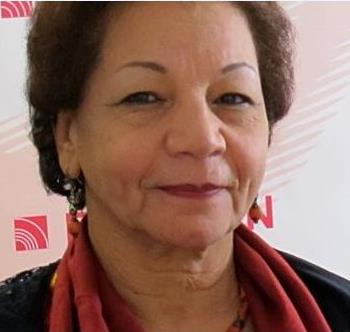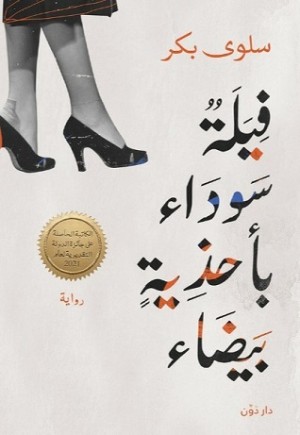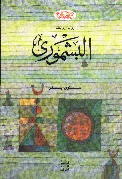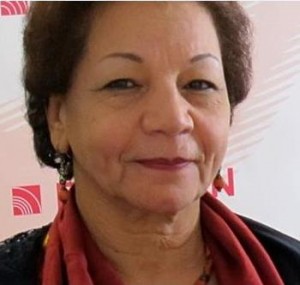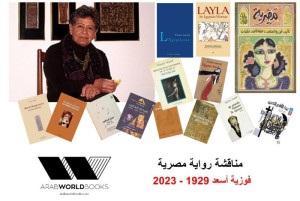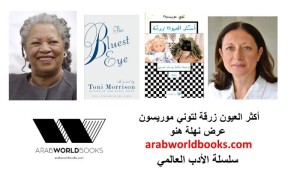Bakr's novel "El-Bashmoury" or The Man from Bashmour was our book club selection in November 2003.
In a country famed for its rich modern literary tradition, Salwa Bakr has become one of Egypt's most respected novelists and short story writers. Born in Cairo in 1949, the daughter of a railway worker, Ms Bakr took a degree in business management in 1972 from Ain Shams University and in literary criticism in 1976 before embarking on a career in journalism.
She began writing in the mid-1970s, and her work has been met with much critical acclaim.
'Zinat fi Janasat ar-Ra'is' (Zinat at the President's Funeral), 1985, Bakr's first collection of short stories, was published at her own expense, but its success ensured that she had no difficulties finding publishers for her other collections, " Maqam'Atiyya' (The Shrine of Atia), 1986, 'An il-Ruh al-lati Suriqat Tadrijiyyan' (On the Gradually Departing Spirit), 1989, and 'Ajin al-Fallaha' (the Peasant Woman's Dough), 1992.
Bakr lived for several years in Cyprus with her husband, where she worked as a film critic for a number of Arabic-language publications, before returning to Egypt in 1986, where she has since been concentrating on her creative writing. Other pieces of Bakr's work, published in English, in addition to 'Writing as a way out', can be found in 'My Grandmother's Cactus' (1993) and 'The Wiles of Men' (1992). the second of her novels, 'The Golden Chariot' )al-'Araba al-dhahabiyya la Tas'ad ila-l-Sama) was published by Garnet Publishing in 1995.
Her novel, 'Wasf al-Bulbul' (Describing the Nightingale) was published in 1993.
Salwa Bakr's short stories were awarded a major prize for fiction by the German national radio in 1993.
Bakr's life and work have been greatly affected by the 1967 Six-Day War defeat of Egypt by Israel- an event which she herself described as the first of many defeats. the repression in all the spheres of Egyptian life and in particular the political sphere is perhaps Bakr's greatest concern. however, she maintains that both men and women can be liberated through the contributions of women's writings.
This information was collected from In the House of Silence, autobiographical Essays by Arab women Writers - Edited By Fadia Faqir, Garnet Publishing, United Kingdom. 1998
A selection of her works are :
'Zinat fi Janasat ar-Ra'is' (Zinat at the President's Funeral), 1985, short stories.
" Maqam'Atiyya' (The Shrine of Atia), 1986, madbouli,short novel and short stories.
'An il-Ruh al-lati Suriqat Tadrijiyyan' (On the Gradually Departing Spirit), 1989
"el-'araba el-thahebeyya" 1991, (The golden Wagon doesn't go to Heaven / novel)
'Ajin al-Fallaha' (the Peasant Woman's Dough), 1992, short novel.
translated to Serbian 2003 - Prosveta
'Wasf al-Bulbul' (Describing the Nightingale) 1993, short novel.
" Araneb" 1994 (Rabbit / short novel and short stories)
Iq'''t muta''kisa (Contrary Rhythms) 1996, short stories
"Layl wa Nahar " 1997, Novel
" Albashmouri" 1998, Novel
Al-Bashmouri II , 2000, Novel
hilm el-seneen 2000 play - GEBO
sawaki el-wakt 2003 novel -Hilal
sho'or el-aslaf 2003 -stories
Bashmouri 1 and 2 translated to french in 2003 - L'Esprit des Peninsules
In English
Golden Chariot (The Arab Women Writers Series)
Published 1997, this satirical novel is set within the walls of a women's prison located outside Cairo during the Nasser era. It focuses on a member of the Alexandrian aristocracy imprisoned for murder and, according to Latifah al-Zayat, is written in a style "similar to the style of folk-tales (al-haki al-sha'bi) which depends on digression, description, accumulation of seemingly separate details, and turning dramatic events into narrative." It is a novel of narrative sophistication which was widely praised in its original Arabic publication and has since been translated into English and other European languages.
The Wiles of Men and Other Stories Published 1993
My Grandmother's Cactus (1993)
The Man from Bashmour, American Univ in Cairo Press, 2007 - translated by Nancy Roberts
The Golden Chariot, American Univ in Cairo Press, 2008 - translated by Dinah Manisty
Achievements
The Man from Bashmour was named as one of the 100 best Arabic novels by the Arabic Writers' Union In 1993, she won the German Deutsche Welle Prize for Literature.Notwithstanding her relatively few novels or collections of short stories, she is highly regarded in Arab literary circles.
